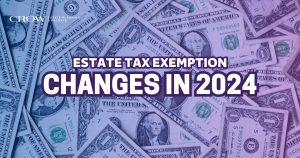The annual adjustment of the estate tax exemption by the Internal Revenue Service (IRS) is an important event for financial planning. In 2024, the estate tax exemption is set to increase to $13.61 million, up from $12.92 million in 2023. This adjustment, while a part of the IRS’s regular inflationary adaptations, continues to play a significant role in estate planning strategies. Additionally, the gift tax exemption is set to rise to $18,000, from $17,000 in 2023. These increased exemptions trace their roots back to legislative changes made in 2017, which are important to consider as they are scheduled to sunset at the end of 2025.
Estate Tax Exemption: A Yearly Adjustment with Long-term Implications
The estate tax exemption’s incremental increase for 2024 may seem modest, but it is part of a larger, more significant change that began in 2017. During that year, legislation was passed that effectively doubled the estate tax exemption, a change that is set to expire at the end of 2025. At this point, the exemption is expected to revert to its pre-2018 levels, adjusted for inflation, which is projected to be around $6-7 million per individual. This potential reversion underscores the importance of strategic long-term estate planning.
The Role of Gift Tax Exemption in Estate Planning
The gift tax exemption, which allows individuals to give $18,000 per year per recipient in 2024 without incurring any gift tax, is a critical tool in estate planning. For couples, this exemption can be especially powerful. They can combine their exemptions to double their annual tax-free gifts to a single individual, allowing them to gift up to $36,000 to a person without any tax implications. This strategy is particularly useful for reducing the taxable portion of an estate over time.
Strategies to Consider in Light of the Sunsetting Provisions
- Maximizing the Current Exemptions: Given that the increased exemptions are set to sunset at the end of 2025, it’s prudent for individuals, especially those with larger estates, to consider maximizing these exemptions now. This could involve making larger gifts or transferring significant assets into trusts.
- Revisiting Estate Plans Regularly: Estate plans should be reviewed and potentially revised to adapt to the changing exemption limits. This is particularly important as we approach the 2025 sunset, which could significantly alter the estate tax landscape.
- Utilizing Annual Gift Tax Exemptions: Leveraging the annual gift tax exemption is a straightforward yet effective way to gradually transfer wealth and reduce the size of an estate. Couples should consider using their combined exemptions for maximum benefit.
- Consultation with Estate Planning Professionals: Navigating the complexities of these changing exemptions requires professional advice. Estate planning professionals can provide valuable insights tailored to individual circumstances and help develop strategies that align with both current and future tax environments.
Wrapping It Up
The IRS’s announcement of the increased estate and gift tax exemptions for 2024, while part of an annual adjustment, has significant implications in the context of the 2017 legislative changes. With the sunset of these increased exemptions looming in 2025, proactive and strategic planning becomes even more crucial. Individuals and couples should consider how best to utilize these exemptions, both annually and in the longer term, to optimize their estate planning strategies.
If you have questions on tax planning questions for your estate, our team of experienced attorneys are here to help. Call Crow Estate Planning and Probate at 615-558-8002 to schedule your free consultation.

